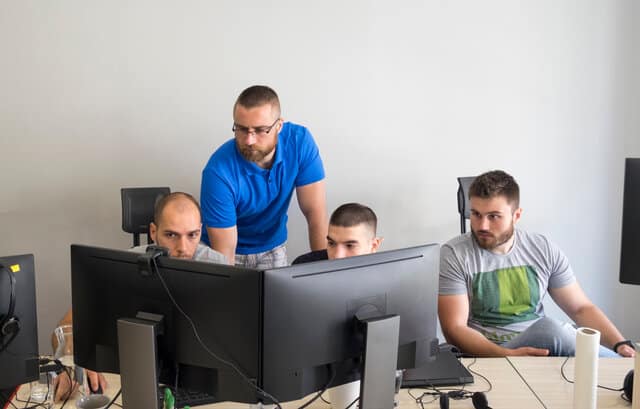


In the rapidly evolving landscape of software development, the demand for efficient and user-friendly applications has never been higher. Organizations across various industries are constantly seeking ways to optimize their operational processes, improve customer experiences, and stay ahead of the competition. This is where Mendix comes into play, offering a low-code development platform that empowers developers to create compelling applications with impressive speed and flexibility. At the heart of this technological revolution is the Mendix developer, a key player in transforming ideas into functional and scalable solutions.
Mendix is a leading low-code application development platform that enables developers to design, develop, deploy, and manage applications with minimal hand-coding. The platform uses visual development, drag-and-drop components, and pre-built templates to accelerate the application development. This approach allows developers to focus more on the business logic and less on the nitty-gritty of coding, fostering collaboration between business and IT teams.
Furthermore, the platform’s built-in version control and collaboration features contribute to team productivity, ensuring that multiple teams can productively work on a project. Additionally, the platform’s monitoring and analytics capabilities enable developers to track application performance, identify bottlenecks, and optimize applications for better user experiences. Overall, Mendix plays a crucial role in empowering organizations to rapidly adapt to evolving business needs while maintaining the scalability and flexibility required for modern applications.
A Mendix developer plays a pivotal role in the software development life cycle, actively influencing the development and success of projects. This role encompasses various essential responsibilities that extend beyond mere coding. Let’s review some key responsibilities associated with the role:
Mendix developers leverage the platform’s visual development capabilities to quickly prototype and iterate on application ideas. This accelerated prototyping process is instrumental in providing users with a visual representation of the end product at an early stage of development. It serves as a dynamic tool for facilitating collaborative feedback, allowing users to actively participate in refining and adjusting the application’s features and functionalities. Thus, the iterative nature of rapid prototyping within Mendix accelerates the development timeline and ensures that the final product aligns closely with the evolving needs and expectations of the end-users.
Mendix developers design applications by assembling visual components, defining data models, and configuring business logic. The platform also empowers developers to create sophisticated user interfaces that contribute to effective and intuitive user experiences. This approach ensures that the design meets the end-user’s technical requirements, expectations, and preferences.
Integration is a crucial aspect of modern applications. Mendix developers integrate applications with various data sources, third-party services, and existing systems. Their role is crucial in establishing and maintaining communication and data flow between different components, ensuring a cohesive and interconnected ecosystem. This integration process contributes significantly to the overall efficiency and functionality of the applications they develop.
Mendix embraces the principles of adaptive software development, allowing developers to operate in a dynamic environment that prioritizes responsiveness to changing business requirements. Developers can easily modify and extend applications as business needs to evolve, ensuring flexibility and adaptability of the applications. This iterative and responsive approach ensures that the applications remain aligned with the ever-changing needs of the business, promoting a continuous cycle of improvement.
Mendix developers often work closely with business analysts and other non-technical teams. The visual, low-code approach of Mendix contributes to bridging the communication gap between diverse teams. This collaborative effort ensures that the developed applications meet technical specifications and resonate with the broader goals and visions of the business, resulting in a more cohesive and well-rounded end product.
Mendix developers manage the deployment of applications to various environments, ensuring a proficient transition from development to production. Additionally, Mendix developers are actively involved in the ongoing maintenance, updates, and optimization of applications, guaranteeing that applications perform optimally in real-world scenarios.

In the dynamic landscape of modern business, organizations face the constant challenge of staying competitive and responsive to evolving market demands. In the realm of application development, where innovation and efficiency are important, Mendix serves as a transformative solution. This low-code development platform accelerates the creation of applications and brings a host of benefits which we will discuss in detail below.
Mendix enables rapid application development, reducing time-to-market for new ideas and features. By embracing a low-code methodology, Mendix simplifies the development process, enabling teams to swiftly turn concepts into fully functional applications. This increased speed is a strategic asset in today’s fast-paced business environment where agility and success go hand in hand.
Traditional software development often involves extensive custom coding, which can be time-consuming and resource-intensive. Mendix’s low-code approach helps developers minimize the amount of custom coding required, leading to a more efficient use of resources. This method reduces development costs and shortens the time it takes for organizations to start seeing the benefits of their investment.
Mendix empowers developers to focus on innovation by automating repetitive tasks. This shift in focus fosters a culture of continuous improvement and creativity, where teams can experiment with new ideas and rapidly prototype solutions. Additionally, Mendix promotes collaboration by providing a common platform for business and IT professionals, breaking down traditional stereotypes. This collaboration ensures that applications align closely with business objectives and are developed with a deep understanding of user needs.
Mendix applications are designed with scalability in mind, capable of adapting to changing business requirements and growing user demands. As businesses evolve, the applications built on Mendix can scale horizontally to adjust to increased workloads and user demands. Moreover, the flexibility embedded in Mendix applications allows for easy adjustments, ensuring that changes in business processes or market dynamics can be accommodated with ease. This adaptability is crucial for organizations seeking to stay ahead in a rapidly changing business environment.
We have explored the nature of Mendix and uncovered key aspects of the role of Mendix developer. Nevertheless, the task of hiring a Mendix developer can present specific challenges, as it requires a strategic approach to ensure that you find a candidate with the right skills and expertise. Let’s now review some tips and tricks that we have prepared to help you increase the likelihood of finding a qualified Mendix developer who can contribute effectively to your low-code development initiatives.
Clearly outline the skills, experience, and qualifications you’re looking for in a Mendix developer. Consider factors such as the level of expertise required, the unique demands of the projects they will be handling, and whether an industry-specific experience is essential. This precision ensures that your recruitment efforts are targeted toward individuals who perfectly match the needs of your low-code development initiatives.
Craft a comprehensive job description that communicates the responsibilities and expectations for the Mendix developer role. Include details about the projects the developer will be involved in, the technologies they will utilize, and any particular skills or tools required for success. A precise job description sets the stage for attracting candidates who not only possess the necessary technical skills but also understand the broader context of their contributions.
Post your job opening on relevant job platforms, such as LinkedIn, Indeed, or specialized tech job boards. Additionally, tap into Mendix communities and forums to connect with a pool of experienced developers who may not be actively searching but could be interested in the right opportunity. This targeted approach increases the likelihood of attracting candidates with specific Mendix expertise.
Review resumes and portfolios to shortlist candidates with Mendix development experience. Look for evidence of relevant skills such as low-code development, application design, and integration, as well as specific experience with the Mendix platform. This phase narrows down the candidate pool, allowing you to focus on individuals whose previous work fits the technical requirements of your projects.
Conduct a technical assessment to evaluate a candidate’s proficiency in Mendix development. This could involve a coding test tailored to low-code development, a review of past projects showcasing Mendix’s expertise, or a hands-on exercise related to the platform. A technical assessment ensures that candidates claim the necessary skills and demonstrate their practical application, providing a more accurate measure of their capabilities.
Assess a candidate’s problem-solving skills by presenting them with real-world scenarios and challenges within the context of Mendix development. Thus, present candidates with scenarios that mirror the complexities they might encounter in your projects. Evaluate their thought process, creativity, and ability to propose effective solutions. This step goes beyond technical proficiency, gauging the candidate’s capacity to address issues and innovate within the specific challenges of Mendix development.
Moving forward, we also share a list of interview questions covering a range of technical, practical, and strategic aspects of this role. The answers to these questions will provide a comprehensive view of the candidate’s abilities as a Mendix developer.
Mendix developer salaries can fluctuate based on multiple factors, encompassing the developer’s experience, location, industry, and specific job requirements. The salary ranges are posed to changes over time due to evolving market trends and economic factors.
As an illustrative example, in the Netherlands, the estimated total pay range for a Mendix developer varies from approximately $53000 – to $69000 per year, which includes base salary and additional pay. In India, the average salary for a Mendix developer is 4.9 Lakhs per year equivalent to around $1300. Notably, the United States stands out as the highest-paying region, with an average Mendix developer salary of $47.36 per hour or $98514 per year.
In the realm of application development, Mendix developers stand at the forefront of innovation. By leveraging the capabilities of the Mendix platform, these developers bridge the gap between business needs and technical implementation, creating solutions that are efficient and scalable. As organizations continue to embrace low-code development for its transformative potential, the role of a Mendix developer becomes increasingly instrumental in shaping the digital future.
Frequently asked questions (FAQ)
DevsData – your premium technology partner
DevsData is a boutique tech recruitment and software agency. Develop your software project with veteran engineers or scale up an in-house tech team of developers with relevant industry experience.
Free consultation with a software expert
🎧 Schedule a meeting
FEATURED IN


DevsData LLC is truly exceptional – their backend developers are some of the best I’ve ever worked with.”
Nicholas Johnson
Mentor at YC, serial entrepreneur


 Build your project with our veteran developers
Build your project with our veteran developers
 Explore the benefits of technology recruitment and tailor-made software
Explore the benefits of technology recruitment and tailor-made software
 Learn how to source skilled and experienced software developers
Learn how to source skilled and experienced software developers




Categories: Big data, data analytics | Software and technology | IT recruitment blog | IT in Poland | Content hub (blog)
